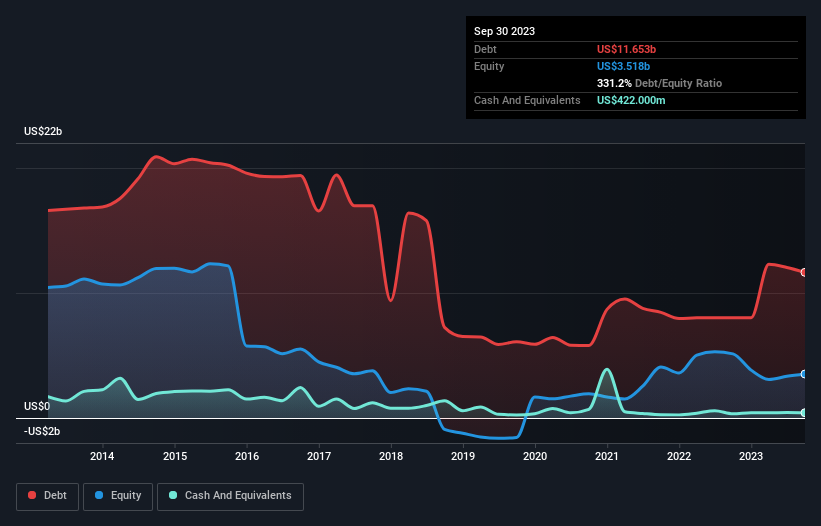- United States
- /
- Electric Utilities
- /
- NYSE:NRG
Health Check: How Prudently Does NRG Energy (NYSE:NRG) Use Debt?

Some say volatility, rather than debt, is the best way to think about risk as an investor, but Warren Buffett famously said that 'Volatility is far from synonymous with risk.' So it might be obvious that you need to consider debt, when you think about how risky any given stock is, because too much debt can sink a company. Importantly, NRG Energy, Inc. (NYSE:NRG) does carry debt. But the real question is whether this debt is making the company risky.
When Is Debt Dangerous?
Debt and other liabilities become risky for a business when it cannot easily fulfill those obligations, either with free cash flow or by raising capital at an attractive price. Part and parcel of capitalism is the process of 'creative destruction' where failed businesses are mercilessly liquidated by their bankers. However, a more usual (but still expensive) situation is where a company must dilute shareholders at a cheap share price simply to get debt under control. By replacing dilution, though, debt can be an extremely good tool for businesses that need capital to invest in growth at high rates of return. The first step when considering a company's debt levels is to consider its cash and debt together.
Check out our latest analysis for NRG Energy
What Is NRG Energy's Debt?
The image below, which you can click on for greater detail, shows that at September 2023 NRG Energy had debt of US$11.7b, up from US$8.02b in one year. However, it also had US$422.0m in cash, and so its net debt is US$11.2b.

How Strong Is NRG Energy's Balance Sheet?
Zooming in on the latest balance sheet data, we can see that NRG Energy had liabilities of US$8.93b due within 12 months and liabilities of US$15.5b due beyond that. Offsetting this, it had US$422.0m in cash and US$3.58b in receivables that were due within 12 months. So it has liabilities totalling US$20.4b more than its cash and near-term receivables, combined.
The deficiency here weighs heavily on the US$12.0b company itself, as if a child were struggling under the weight of an enormous back-pack full of books, his sports gear, and a trumpet. So we definitely think shareholders need to watch this one closely. At the end of the day, NRG Energy would probably need a major re-capitalization if its creditors were to demand repayment. When analysing debt levels, the balance sheet is the obvious place to start. But ultimately the future profitability of the business will decide if NRG Energy can strengthen its balance sheet over time. So if you want to see what the professionals think, you might find this free report on analyst profit forecasts to be interesting.
In the last year NRG Energy had a loss before interest and tax, and actually shrunk its revenue by 2.8%, to US$30b. We would much prefer see growth.
Caveat Emptor
Importantly, NRG Energy had an earnings before interest and tax (EBIT) loss over the last year. Its EBIT loss was a whopping US$1.8b. When we look at that alongside the significant liabilities, we're not particularly confident about the company. It would need to improve its operations quickly for us to be interested in it. Not least because it had negative free cash flow of US$2.5b over the last twelve months. So suffice it to say we consider the stock to be risky. There's no doubt that we learn most about debt from the balance sheet. However, not all investment risk resides within the balance sheet - far from it. We've identified 1 warning sign with NRG Energy , and understanding them should be part of your investment process.
If, after all that, you're more interested in a fast growing company with a rock-solid balance sheet, then check out our list of net cash growth stocks without delay.
Valuation is complex, but we're here to simplify it.
Discover if NRG Energy might be undervalued or overvalued with our detailed analysis, featuring fair value estimates, potential risks, dividends, insider trades, and its financial condition.
Access Free AnalysisHave feedback on this article? Concerned about the content? Get in touch with us directly. Alternatively, email editorial-team (at) simplywallst.com.
This article by Simply Wall St is general in nature. We provide commentary based on historical data and analyst forecasts only using an unbiased methodology and our articles are not intended to be financial advice. It does not constitute a recommendation to buy or sell any stock, and does not take account of your objectives, or your financial situation. We aim to bring you long-term focused analysis driven by fundamental data. Note that our analysis may not factor in the latest price-sensitive company announcements or qualitative material. Simply Wall St has no position in any stocks mentioned.
About NYSE:NRG
NRG Energy
Operates as an energy and home services company in the United States and Canada.
Established dividend payer and slightly overvalued.
Similar Companies
Market Insights
Community Narratives



